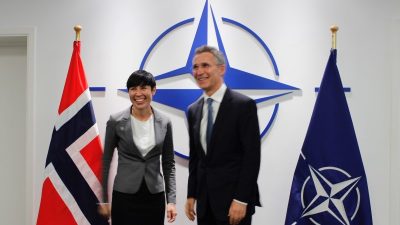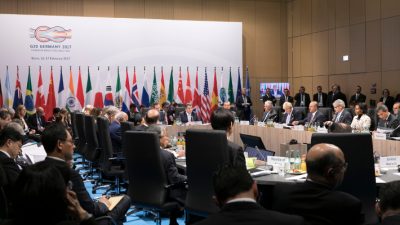NEWS ANALYSIS: Top Norwegian officials have been busy on the European continent this week, and happy to be able to take part in a flurry of meetings at NATO in Brussels, the G20 in Bonn and the Munich Security Conference. At a time of uncertainty and even fear following the inauguration of US President Donald Trump, Norway’s defense and foreign ministers are more keen than ever on cementing and strengthening ties to European partners and the US as well.

“We’re living in uneasy times,” stated Norwegian Defense Minister Ine Eriksen Søreide just before leaving for NATO’s meeting of all its defense ministers and the new US Defense Secretary James Mattis. “NATO has to be screwed together so that we can meet all the challenges.”
Søreide said Norway wants NATO to make “necessary changes” in its commando structure and “revitalize” its marine strategy. She’s especially concerned about the Arctic and far northern areas of the Atlantic, where Russian military presence and activity has been high of late. There’s also been concern over whether Trump will split the alliance over the refugee issue, but the NATO ministers agreed to set up a new regional NATO in Naples with special responsibility for NATO’s southern flank, where many refugees currently remain stranded.
Like everyone else, Søreide was perhaps most eager to meet “my American colleague,” Mattis. Trump’s harsh criticism of NATO both during his election campaign and after he won, and his recent comment that NATO is “obsolete,” have worried Norway and the most other members of the alliance. “It’s important for NATO that the trans-Atlantic ties are strong and that we continue tight cooperation on defense issues,” Søreide said.
‘No ultimatum’ on defense budgets
After Mattis spoke on Wednesday, Søreide told newspaper Aftenposten that she didn’t think he actually delivered an “ultimatum” in calling on NATO members to boost their defense budgets, to at least 2 percent of their gross national product (GNP). She claimed his message “was the same that has been repeated for many years. If the Americans are to continue to engage themselves in NATO, the Europeans (including Norway) also have to take on a large portion of the responsibility.”
Søreide claimed Norway has taken the messages from the US seriously, but she wouldn’t give any guarantees that Norway will reach the 2 percent goal by 2024. Norway’s defense spending amounted to 1.54 percent of GNP in 2016. “We can’t predict for sure what our GNP will be in 2018 or 2019,” she told Aftenposten. “What’s most important is that we are investing correctly, a lot, and increasing operating budgets strongly. That’s being received very well by the Americans.”
NATO’s secretary general himself, Jens Stoltenberg, didn’t boost Norway’s defense budgets when he was Norwegian prime minister enough to, for example, provide adequate operating funds for all of the country’s new frigates. Now Søreide has done so, while Stoltenberg is actively urging NATO members to all increase their defense spending. Sharing the defense burden more fairly with the US, Stoltenberg claimed this week, is now his “highest priority.”
‘Confirmed US commitment’
Søreide interpreted Mattis’ remarks in Brussels as confirming the US’ commitment to NATO. Other commentators claim Mattis is the man who will get European leaders to believe they can still rely on the US, not least after he called NATO the “bedrock” of its relations with Europe. Hopes remained high that Mattis will also eventually clarify US policy towards Russia, after Trump has issued many mixed signals. Some NATO members think the alliance is too preoccupied with concerns over Russia, and think more attention should be paid to fighting terrorism and conflicts over refugees and immigration. In addition to the Naples center, the NATO ministers also decided to raise its presence in the Black Sea.
Trump’s firing of his National Security Adviser Michael Flynn after less than a month may also give Mattis, viewed as among the more reasonable and moderate members of Trump’s cabinet, greater latitude and authority within the Trump Administration. Uncertainty continued on Friday, however, after the man Trump tapped to succeed Flynn, Robert Harward, turned down the offer, reportedly because of fears he wouldn’t be able to choose his own staff and have enough independence. Harward was viewed by security and defense experts at both ends of the political spectrum as having excellent credentials and even being “a nice guy,” so his rejection of Trump’s offer is a disappointment to many both in the US and Europe, and another blow for Trump.

Meanwhile this week, Norway’s Foreign Minister Børge Brende was in Bonn after German Chancellor Angela Merkel invited Norway (along with The Netherlands, Singapore and three Asian and African organizations) to be a guest while it hosted the annual G20 meeting of foreign ministers of the world’s 20 largest economies. That gave Brende an opportunity to have a brief meeting with another important new member of Trump’s cabinet, US Secretary of State Rex Tillerson. Both Brende and his predecessor, former Norwegian Foreign Minister Jonas Gahr Støre, had close ties with Tillerson’s predecessors Hillary Clinton (whom Trump still denigrates and views as a bitter rival and foe) and with John Kerry. Now Brende, along with most all his global counterparts, is keen to get to know and build up ties with Tillerson.
Brende claimed he was satisfied with his brief exchange with Tillerson, telling state broadcaster NRK that he’d also met Tillerson earlier when he was chief executive of Exxon Mobil. “Tillerson was clear that he wants to maintain the close cooperation between the US and Norway, and that he want to develop relations,” Brende told NRK. “I have a good impression of Tillerson. He’s a very experienced leader and I’ve heard from people in the US State Department that he has made a good impression there as well.”
High-profile presence at Munich Conference
Both Brende and Søreide were also taking part this weekend in the Munich Conference, which was being attended by both Tillerson, Mattis and the new US Vice President Mike Pence. In Munich, Norway has also been invited to host an important session on preventing war and nurturing peace, after the country played an key role in the Colombian peace pact. In Munich, Brende will be able to meet all the foreign ministers at the Munich Conference during a dinner and he was also due to have bilateral talks with the UK’s new foreign minister, Boris Johnson, and the new UN Secretary General Antonio Guterres. Søreide, meanwhile, met Mattis again in Munich on Friday, where she told NRK they talked about adapting NATO to “a new strategic reality.”
“It’s important for Norway to be able to talk about how important it is to support peace efforts,” Brende said. It’s also important for Norway simply to have a presence at such high-level meetings.
As newspaper Aftenposten editorialized on Friday, Norway has to also maintain relations with the US no matter who sits in the White House. “For one thing, it’s important to remember that fewer than half of American voters voted for Trump, and in two years, the 2020 presidential campaign will begin,” Aftenposten wrote. “The good relations between the US and Europe can be reinstated as early as January 2021.
“Secondly, Trump’s regime could become more dangerous if Europe cuts its ties (to the US),” Aftenposten continued, using surpringly strong language. “President Trump creates a lot of noise and uncertainty … while the practical side of politics is carried out by more rational forces.” Aftenposten, Norway’s biggest newspaper, referred to Mattis, Tillerson and Pence as being among those who are “more rational.” That’s why their meetings with Norwegian ministers this week were important, however brief, and why the newspaper thinks it’s also best “to have the most possible contact both with Trump and the people around him.”
newsinenglish.no/Nina Berglund

